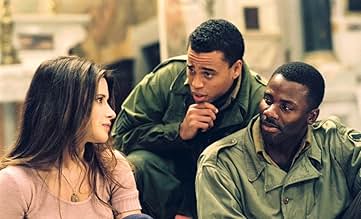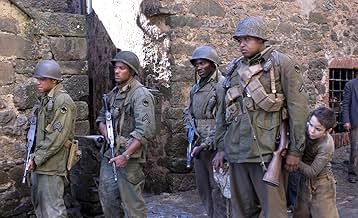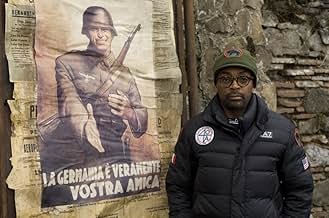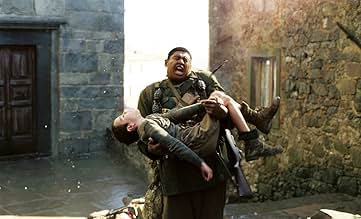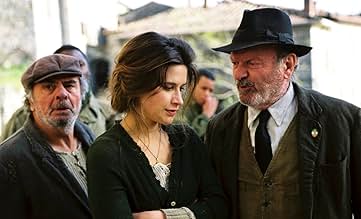Set in 1944 Italy, the story of four black American soldiers who get trapped in a Tuscan village during WWII.Set in 1944 Italy, the story of four black American soldiers who get trapped in a Tuscan village during WWII.Set in 1944 Italy, the story of four black American soldiers who get trapped in a Tuscan village during WWII.
- Awards
- 1 win & 10 nominations total
Lidia Biondi
- Natalina
- (as Lydia Biondi)
Featured reviews
Lee makes a European film allowing philosophical questions and moral questions to supplant desire for personal satisfaction and identifiable this is a Spike Lee film signature patterns. There are a number of excellent directorial decisions in this film. Lee's camera is sensitive, gentle and sincere. He shows us the many ways our eyes are deceived and how much of what we perceive is illusion. I think its a great film that is inspirational, has meaning and is both emotionally and intellectually satisfying. I hope that Lee will continue to make films outside his comfort zone and articulate events from the African American experience around the world to show our contribution to history and civilization.
Let me begin by saying that this movie was okay. But it could have been way better.
The story itself is great and kept me interested until the end, but it's execution could have been much better. Throughout the movie, some of the acting ranged from good to bad to downright lame. Jon Turturro's cameo as a detective was extremely disappointing, for instance. The acting picks up when the flashback begins, but every so often it rockets down.
The battle scenes were, for lack of a better word, comical. They were over the top and stereotypical of any other war movie, complete with bodies being flung from explosions in an exaggerated fashion and people sobbing over amputated rubber limbs.
The characters were all over the place on the sympathy scale. Stamps and Trey (or is it Train?) elicit plenty of sympathy, whereas Bishop and whatever the girl's name was only brought out anger from me.
The worst part of the movie is the editing, though. Some of the battle scenes are choppy, and there are entire cuts to different scenes for split seconds that we could have done without (they serve no purpose whatsoever).
My biggest problem was the stereotypical racism of the white characters in the movie. The only American white people in the movie are shown as black-hating jerks who's ignorance leads them to destruction.
Overall, the movie was good. Not amazing, not great, definitely not a masterpiece, but it wasn't terrible or bad or crappy. It was a great story, but it could have been executed much better.
6.5 Stars.
The story itself is great and kept me interested until the end, but it's execution could have been much better. Throughout the movie, some of the acting ranged from good to bad to downright lame. Jon Turturro's cameo as a detective was extremely disappointing, for instance. The acting picks up when the flashback begins, but every so often it rockets down.
The battle scenes were, for lack of a better word, comical. They were over the top and stereotypical of any other war movie, complete with bodies being flung from explosions in an exaggerated fashion and people sobbing over amputated rubber limbs.
The characters were all over the place on the sympathy scale. Stamps and Trey (or is it Train?) elicit plenty of sympathy, whereas Bishop and whatever the girl's name was only brought out anger from me.
The worst part of the movie is the editing, though. Some of the battle scenes are choppy, and there are entire cuts to different scenes for split seconds that we could have done without (they serve no purpose whatsoever).
My biggest problem was the stereotypical racism of the white characters in the movie. The only American white people in the movie are shown as black-hating jerks who's ignorance leads them to destruction.
Overall, the movie was good. Not amazing, not great, definitely not a masterpiece, but it wasn't terrible or bad or crappy. It was a great story, but it could have been executed much better.
6.5 Stars.
Length is a factor for this film, and it's not the normal action driven war film. I was lucky enough to attend the premier in NY and from the perspective of a Cadet at West Point, I would say that I respected this film BECAUSE it "jumped around." It showed all perspectives and that there were people with good intentions on all sides. The bad intentions were included as well, and though it doesn't grab you the entire time, it tells an interesting tale. Sadly, most people don't go to see a war film for this reasons, they all want Saving Private Ryan these days. But that's not what war is always about, and this film shows the other aspects. The black soldiers are each equally representative of varying perspectives that these men had. With a lot of duality also represented, this film leaves a lot to think about if you watch it with the right eye. It seems most people I've talked to have a problem with length and action, but if you don't pay so much attention to that and just enjoy it, you'll find a nice film that takes a different approach.
A funny thing happens when you're counted among the preeminent talents in any contemporary art form: Everything you do must approach sublime... or else. Something less funny happens when your art is as socially outspoken as Spike Lee's body of work: Folk wait with baited breath to name every shred of detail that marks your work as somehow less than sublime. And in so doing, they ever miss the forest for the trees.
Lee's latest "joint," MIRACLE AT ST. ANNA, based on James McBride's novel of the same name, no doubt will suffer from such deconstruction, some of which will be justified. At 160+ minutes, the fictional recollection of four black American WWII soldiers who get trapped in an Italian village during a German insurgence, can wax tedious. And Lee's defaulting to certain conventions of the war genre and his own signature style occasionally comes off forced, sentimental, even ridiculous. After, say, the 10th close-up of a slain human -- eyes still open in horror -- we may not need to see an 11th, 12th, 13th. And any casual student of cinema might spot Lee's attempted tear-jerker ending a la CINEMA PARADISO coming a mile away.
Then there are the technical shortcomings of personnel who should know better: A score by Terence Blanchard is uncharacteristically overwrought; cinematography by Matthew Libatique is alternately breathtaking and obtuse; and a self-adapted screenplay by McBride suffers from a conspicuously uncommitted point of view. But, indeed, what may most undercut any visceral charm of MASA is at once admirably realistic: The film's characters aren't particularly moving in their conflicted natures and utter lack of romance. Only a visionary Italian boy, played beautifully by newcomer Matteo Sciabordi, and the black American soldier who befriends him, played by the hulking Omar Benson Miller, elicit any real sympathy.
All told, the numerous missteps do not seriously undercut a captive tale of humans -- white, black and brown -- who find themselves thrown into a hell not of their making and forced to juggle universal sensibilities with the duties of their divergent identities. In this regard, Lee's latest shows marked progress: Gone are the one-sided depictions of whites. Fascist-era native Italians are shown here in all their warring complexity; American actor D.B. Sweeney plays a key, if understated, role as a white U.S. colonel opposed to the exploitation of the all-black 92nd Army Division; even Nazi stormtroopers here are given back a modicum of humanity. Neither is the African American experience sanctified: Actor Michael Ealy's preacher-turned-soldier character is equal parts charming and vile; and one pre-Civil Rights-era American flashback begs the question of what line separates hero and villain. If one is willing to forgive the imperfect details from a filmmaker who has proved capable of better, the aggregate statement is hardly ineffectual.
Lee's real victory here shouldn't be missed. MASA does not rise to the level of the best of the genre. Neither is it worthy to be called the definitive tribute to an unsung 92nd Army Division or the souls lost at Sant'Anna di Stazzema. But it is always watchable, always interesting -- and as an engaging enough mystery film and thoughtful ensemble piece with an important, forgotten corner of human failure as backdrop, it succeeds.
Lee's latest "joint," MIRACLE AT ST. ANNA, based on James McBride's novel of the same name, no doubt will suffer from such deconstruction, some of which will be justified. At 160+ minutes, the fictional recollection of four black American WWII soldiers who get trapped in an Italian village during a German insurgence, can wax tedious. And Lee's defaulting to certain conventions of the war genre and his own signature style occasionally comes off forced, sentimental, even ridiculous. After, say, the 10th close-up of a slain human -- eyes still open in horror -- we may not need to see an 11th, 12th, 13th. And any casual student of cinema might spot Lee's attempted tear-jerker ending a la CINEMA PARADISO coming a mile away.
Then there are the technical shortcomings of personnel who should know better: A score by Terence Blanchard is uncharacteristically overwrought; cinematography by Matthew Libatique is alternately breathtaking and obtuse; and a self-adapted screenplay by McBride suffers from a conspicuously uncommitted point of view. But, indeed, what may most undercut any visceral charm of MASA is at once admirably realistic: The film's characters aren't particularly moving in their conflicted natures and utter lack of romance. Only a visionary Italian boy, played beautifully by newcomer Matteo Sciabordi, and the black American soldier who befriends him, played by the hulking Omar Benson Miller, elicit any real sympathy.
All told, the numerous missteps do not seriously undercut a captive tale of humans -- white, black and brown -- who find themselves thrown into a hell not of their making and forced to juggle universal sensibilities with the duties of their divergent identities. In this regard, Lee's latest shows marked progress: Gone are the one-sided depictions of whites. Fascist-era native Italians are shown here in all their warring complexity; American actor D.B. Sweeney plays a key, if understated, role as a white U.S. colonel opposed to the exploitation of the all-black 92nd Army Division; even Nazi stormtroopers here are given back a modicum of humanity. Neither is the African American experience sanctified: Actor Michael Ealy's preacher-turned-soldier character is equal parts charming and vile; and one pre-Civil Rights-era American flashback begs the question of what line separates hero and villain. If one is willing to forgive the imperfect details from a filmmaker who has proved capable of better, the aggregate statement is hardly ineffectual.
Lee's real victory here shouldn't be missed. MASA does not rise to the level of the best of the genre. Neither is it worthy to be called the definitive tribute to an unsung 92nd Army Division or the souls lost at Sant'Anna di Stazzema. But it is always watchable, always interesting -- and as an engaging enough mystery film and thoughtful ensemble piece with an important, forgotten corner of human failure as backdrop, it succeeds.
As a black man who fully believes in black pride and progress, I must say I am truly disappointed with spike lee's new movie right now. I don't know where to begin in regards to expressing my disappointment but I will try. Considering how spike tries to come off as being very afro-centric, his portrayal of black characters was very insulting. There were so many typical blacks in film stereotypes in the movie that I just shook my head most of the time. For instance you had a black man with a gold tooth and stocking cap on, another that was enormous in size but brainless and country, and then to put the cherry on top the 2 guys are fighting over a white woman they met like 2 days ago and kept drooling over. Contrary to popular belief most of the white American soldiers didn't look like the actors in the movies made in the 50's and 60's. The actors looks were ploy to just associate good looks and chivalry with American soldiers in order to build moral for soldiers when they left and came home and to keep ppl interested in the movie. Another thing that really bothered me was that black films don't always need to be funny or trying to evoke laughter. This movie was suppose to be dramatic touching upon a serious subject and should have been directed in the same manner. Then the scoring of the movie was horrible. Even the little parts where he tries to show difference between African Americans and black puerto ricans was off and unnecessary. During that time those hispanics that were black or mulatto didn't try to act like there was a difference between the 2 other than language and maybe certain foods because they faced the same discriminations in PR, DR, and CUBA as in the US. These are just some of the issues I had with this movie. I think antoine faqua, who did training day and arthur, should have done this movie. I am just waiting now to see the mockery of hannibal that vin diesel does.
Did you know
- TriviaSamuel L. Jackson turned down the offer to play as Corporal Hector Negron to work on Lakeview Terrace (2008).
- GoofsWhen the professor examines the marble head he recognizes it as the "Primavera" from Santa Trinità in Florence. He assumes it is by Bartolomeo Ammannati, but the bridge is by Ammannati; the sculpture is by Pietro Francavilla.
- Quotes
Livingston: Safety is the greatest risk of all, because safety leaves no room for miracles and miracles are the only sure thing in life.
- SoundtracksFaccetta Nera
Written by Gustavo Cacini (as Cascini) / Giuseppe Micheli (as Micheli) / Vincenzo Raimondi / Arnaldo Stazzonelli (as Stazzonelli)
Edizioni Bixio C.E.M.S.A.
Details
- Release date
- Countries of origin
- Official site
- Languages
- Also known as
- Untitled Spike Lee WWII Project
- Filming locations
- Production companies
- See more company credits at IMDbPro
Box office
- Budget
- $45,000,000 (estimated)
- Gross US & Canada
- $7,919,117
- Opening weekend US & Canada
- $3,477,996
- Sep 28, 2008
- Gross worldwide
- $9,333,654
- Runtime2 hours 40 minutes
- Color
- Sound mix
- Aspect ratio
- 2.39 : 1
Contribute to this page
Suggest an edit or add missing content







